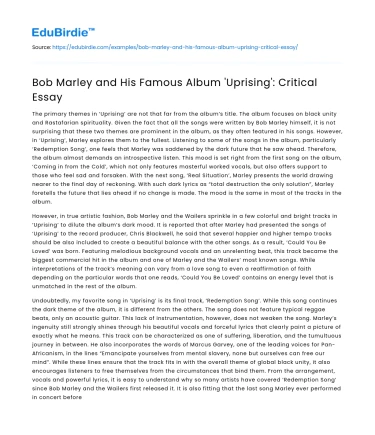The primary themes in ‘Uprising’ are not that far from the album’s title. The album focuses on black unity and Rastafarian spirituality. Given the fact that all the songs were written by Bob Marley himself, it is not surprising that these two themes are prominent in the album, as they often featured in his songs. However, in ‘Uprising’, Marley explores them to the fullest. Listening to some of the songs in the album, particularly ‘Redemption Song’, one feels that Marley was saddened by the dark future that he saw ahead. Therefore, the album almost demands an introspective listen. This mood is set right from the first song on the album, ‘Coming in from the Cold’, which not only features masterful worked vocals, but also offers support to those who feel sad and forsaken. With the next song, ‘Real Situation’, Marley presents the world drawing nearer to the final day of reckoning. With such dark lyrics as “total destruction the only solution”, Marley foretells the future that lies ahead if no change is made. The mood is the same in most of the tracks in the album.
However, in true artistic fashion, Bob Marley and the Wailers sprinkle in a few colorful and bright tracks in ‘Uprising’ to dilute the album’s dark mood. It is reported that after Marley had presented the songs of ‘Uprising’ to the record producer, Chris Blackwell, he said that several happier and higher tempo tracks should be also included to create a beautiful balance with the other songs. As a result, ‘Could You Be Loved’ was born. Featuring melodious background vocals and an unrelenting beat, this track became the biggest commercial hit in the album and one of Marley and the Wailers’ most known songs. While interpretations of the track’s meaning can vary from a love song to even a reaffirmation of faith depending on the particular words that one reads, ‘Could You Be Loved’ contains an energy level that is unmatched in the rest of the album.
Save your time!
We can take care of your essay
- Proper editing and formatting
- Free revision, title page, and bibliography
- Flexible prices and money-back guarantee
Undoubtedly, my favorite song in ‘Uprising’ is its final track, ‘Redemption Song’. While this song continues the dark theme of the album, it is different from the others. The song does not feature typical reggae beats, only an acoustic guitar. This lack of instrumentation, however, does not weaken the song. Marley’s ingenuity still strongly shines through his beautiful vocals and forceful lyrics that clearly paint a picture of exactly what he means. This track can be characterized as one of suffering, liberation, and the tumultuous journey in between. He also incorporates the words of Marcus Garvey, one of the leading voices for Pan-Africanism, in the lines “Emancipate yourselves from mental slavery, none but ourselves can free our mind”. While these lines ensure that the track fits in with the overall theme of global black unity, it also encourages listeners to free themselves from the circumstances that bind them. From the arrangement, vocals and powerful lyrics, it is easy to understand why so many artists have covered ‘Redemption Song’ since Bob Marley and the Wailers first released it. It is also fitting that the last song Marley ever performed in concert before his passing was ‘Redemption Song’.
Ultimately, ‘Uprising’ is an amazing album from beginning to end. By the time Bob Marley and the Wailers released this album, they had already been performing for a long time and had become global icons. Their artistic maturity is evident in ‘Uprising’. Despite the fact that many tracks in the album feature simple arrangements, best epitomized only by the use of an acoustic guitar in ‘Redemption Song’, the weight of the lyrics in most of them ensures that ‘Uprising’ will remain one of the most revered reggae albums. Further, while it is unfortunate that Bob Marley passed before releasing another album, ‘Uprising’ was a befitting final window into his beautiful soul. As a result, people around the world will forever have songs of freedom – redemption songs.






 Stuck on your essay?
Stuck on your essay?

